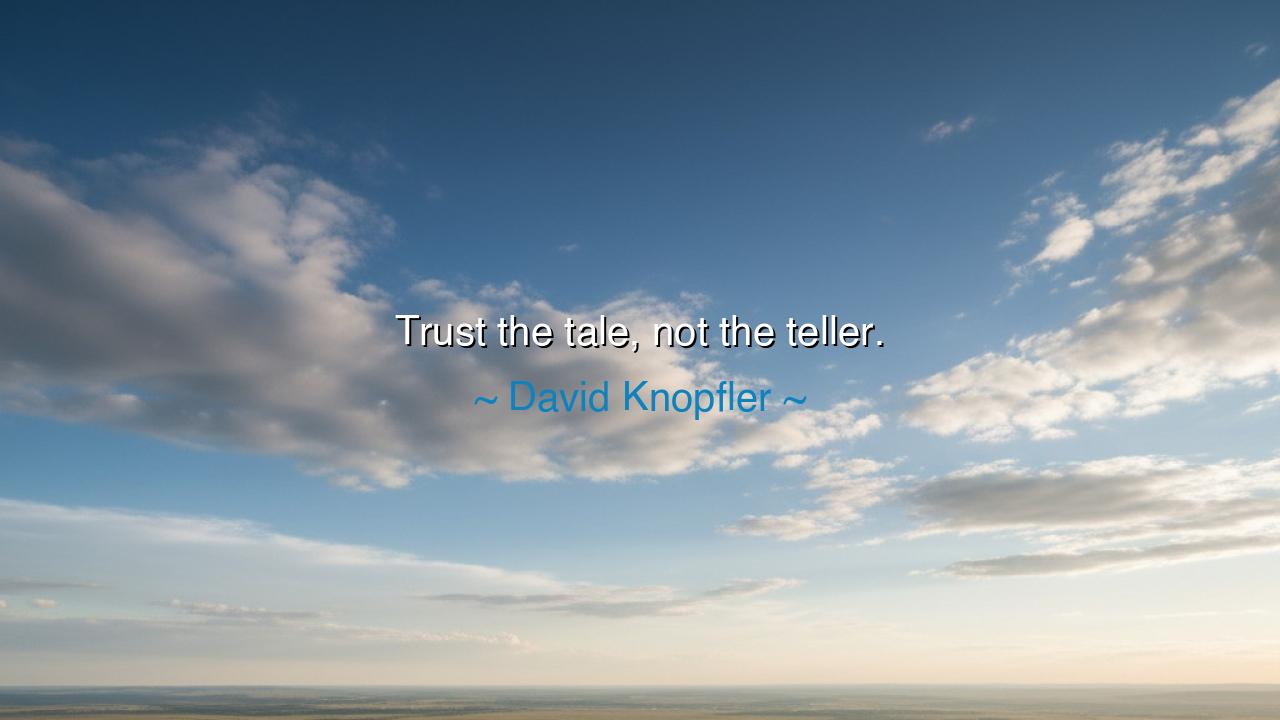
Trust the tale, not the teller.






Hear now the words of David Knopfler: “Trust the tale, not the teller.” This saying, though modern in its utterance, carries the eternal breath of wisdom. It reminds us that truth does not depend upon the vessel that bears it. The tale may shine with light even when the teller is clouded in weakness, sin, or imperfection. For the human voice is mortal and flawed, but the story, once loosed into the world, may carry within it a spark of the eternal.
Consider how often men and women have turned away from wisdom because they mistrusted the messenger. Yet wisdom does not cling to the lips of the speaker—it flies beyond them, like a bird freed from the hand that once held it. The tale must be judged by its own strength, its own resonance with the soul. The teller may be vain, foolish, or corrupted, yet still, the tale may bear a truth that endures. To dismiss the tale because of the weakness of the teller is to cast away gold because it was mined by soiled hands.
History bears witness to this law. Think of the mathematician Évariste Galois, fiery and reckless, who died at the age of twenty-one in a senseless duel. Many called him unruly, untrustworthy, a misfit. Yet from his pen flowed the beginnings of group theory, a tale of mathematics that would change the course of science. The man perished in obscurity, but the tale he told in symbols lives on, trusted and revered, while the teller lies forgotten in his grave. The truth of his work outlived the turmoil of his life.
So too in the realm of faith and myth. The ancient poets of Greece were not without their faults, yet their epics endure. Homer himself is but a shadow; some doubt he ever lived. Yet who denies the power of the Iliad and the Odyssey? The teller fades into dust, but the tale remains like a pillar through the ages. The wisdom is this: we are not called to worship the vessel, but to drink of the water it bears.
Yet beware, for the opposite danger also lies in wait. To trust the teller and not the tale is to walk blind into error. How many rulers and demagogues have ensnared the hearts of the people with their charm, only for their words to rot like fruit on the tongue? The authenticity of the tale must be weighed, tested, and discerned, not swallowed whole because of love for the speaker. Let the tale stand trial before the tribunal of your conscience, not be carried into your heart on the wings of blind adoration.
The lesson is thus: listen with open ears, but judge with a steady heart. Do not cast aside wisdom because the one who spoke it stumbled, nor embrace folly because it was wrapped in eloquence. Test the tale—see if it holds light, see if it endures the fire of reason and the trial of time. A story worth trusting will reveal its strength not in who told it, but in what it awakens within you.
Therefore, in your daily life, act with discernment. When counsel comes to you, hear it, but weigh it. When inspiration stirs you, ask not only who spoke it but what it says. And when you yourself speak, strive not to polish your name, but to give birth to tales that shine on their own, needing no defense from your reputation. For in the end, it is the tale that outlives us all, carrying our voices like whispers through the corridors of time.






VHLe Van Hẚo
I find this quote fascinating because it touches on the power of interpretation. It’s as if Knopfler is saying that meaning belongs to the listener as much as to the creator. The teller may have intentions or ego, but the tale itself becomes something purer — something communal. Still, I wonder if that absolves storytellers of responsibility for their influence. Shouldn’t we also hold them accountable for how their tales shape others?
GADang Nguyen Gia An
This statement feels both philosophical and practical. It suggests that stories have a life of their own — that truth can transcend the flaws or biases of the storyteller. Yet it raises a tough question: how do we discern when a tale is genuine if we’re told to ignore who’s telling it? Perhaps Knopfler is asking us to trust in the message’s resonance with our own experience, not the reputation of its source.
DHThuy Duong Hoang
I love the simplicity of this line — it’s like a gentle nudge to focus on meaning rather than personality. But I can’t help but wonder how realistic that is today. In a culture obsessed with authors, celebrities, and influencers, can we ever truly detach the message from the messenger? Maybe this is a challenge to modern audiences to value substance over charisma or personal brand.
TTuan
This quote really makes me think about how we separate art from the artist. It’s an elegant reminder that truth or beauty in a story can exist independently of the person who created it. But is that always possible? If an artist’s actions or beliefs are unethical, can we still appreciate their work without feeling complicit? It’s such a complicated tension between moral judgment and aesthetic value.